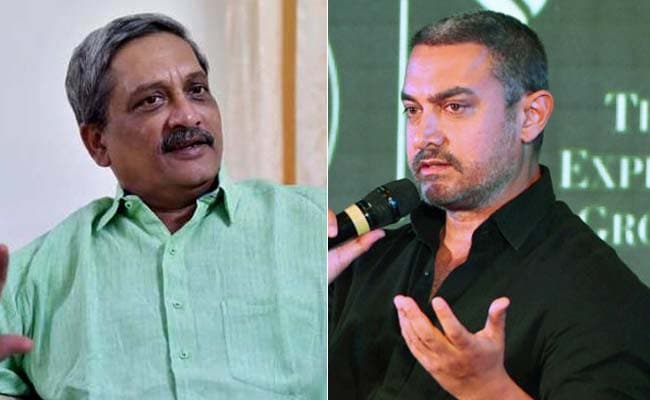Parrikar's defenders will no doubt say that there's nothing wrong with a boycott. And, indeed, there isn't - consumer boycotts of companies are perfectly acceptable forms of mobilization. But let's be clear: it's one thing if a random member of the public or a political party organizes a boycott. It's quite another thing if one of India's senior-most ministers speaks approvingly of organized harassment. Whatever his opinion of the ends, he has to try and rise above the fray in terms of the methods he advocates.
The sad truth is that Parrikar, politically, just doesn't seem ready for prime-time. Perhaps he misses the smaller stage of his native Goa, where an all-powerful Chief Minister can go off script and not suffer the kind of examination that the Union Defence Minister undergoes. Perhaps, since he was speaking in Marathi at the time, he just forgot which stage he was actually on, and the role he now needs to play.
This isn't the first time that Parrikar has startled everyone with indiscretion and poor judgment. On this occasion, he embarrassed his party by revealing that it views trolling and harassment as perfectly valid methods of protest - and that too against a company, Snapdeal, that's part of the one sector in India that seems to be doing relatively well at the moment.
But, on previous occasions, he has committed even more serious errors of judgment. Consider for example the time last year that he told a phalanx of journalists and a battalion of cameras that "you have to neutralise terrorists through terrorists only". This was a strategic blunder of the highest magnitude. It lost India the moral high ground it has worked hard to occupy. It equated us with Pakistan. It gave oxygen to Pakistan's long-standing claims that India has been supporting terrorism within Pakistan - an argument which that country has constantly used to defang our protests about the terrorism it sponsors within India.
That Parrikar knew he shouldn't be talking about this stuff was clear from what else he said on that occasion: "If any country, why Pakistan, is planning something against my country, I will take proactive steps. Of course, not in the public domain." I mean, this is brilliant. Declare in advance the secret stuff you plan to do, why don't you? The attention to the national interest that one truly expects from the Defence Minister of India!
Parrikar has been, in general, a disappointment. He came to New Delhi from Goa in a cloud of expectation: an Indian Institute of Technology man, a noted moderate within his party who had a reputation for effectively and inclusively ruling his state. As Defence Minister, he has been a tremendous disappointment. Not just because of the "defence" part - where his ministry continues to put unnecessary hurdles and delays in the path of the "Make in India" project - but also because of the "minister" part.

Defence Minister Manohar Parrikar spoke about Aamir Khan and Snapdeal being taught an appropriate "lesson" after the actor expressed concern, last year, about what he called an atmosphere of intolerance
But the problem is that party spokesmen, rather than setting an exalted tone for debates, appear unbriefed on television and then take the caricature of a reasoned position that the anchor would prefer them to take. Their puerile partisans on Twitter will applaud. Rapidly, that becomes the party position in people's eyes. The leaders of the government or the party then have to deal with a difficult decision: appall regular people by allowing this narrative to continue, or offend their base by pushing back against it? Presumably since they sympathise more with their base, they never push back strongly or on time.
Worse, seeing no push-back from the leadership of the government or the party, senior ministers are tempted to seek a share of that same adulation. Seeing no accountability for BJP spokesmen and functionaries making inane and dangerous comments about Aamir Khan or his employers being anti-national, ministers like Parrikar imagine it's OK if they too hold forth on that subject and in those terms.
In the process, what we are left with is the debasement of public discourse, and the reduction of a party and a government to the most extremist position possible. Rather than government sending the party to the middle - which has been the traditional belief among political scientists - we have the party being shifted further to the extreme than when it campaigned.
People like Parrikar, intelligent career politicians, should have been able to figure out this process and shut it down. But it appears that few in the council of ministers are capable of understanding the dangers. One of them who does, Nitin Gadkari, identified the problem, as he saw it, to Shekhar Gupta during the "Off the Cuff" programme recently: "I feel it will take time for us to accept the mentality of a ruling party. We have so much experience of being an opposition party... We are such a democratic party that everybody speaks." That's the best spin you could put on it. But it's been more than two years in, and it's time to have ministers capable of thinking before they speak. And it appears Parrikar isn't among them.
He misses Goa, we are told. Perhaps he should be sent back there.
(Mihir Swarup Sharma is a fellow at the Observer Research Foundation.)
Disclaimer: The opinions expressed within this article are the personal opinions of the author. The facts and opinions appearing in the article do not reflect the views of NDTV and NDTV does not assume any responsibility or liability for the same.


